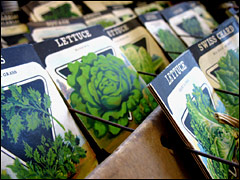Articles by Kurt Michael Friese
Kurt Michael Friese is chef/owner of Devotay in Iowa City, serves on the Slow Food USA Board of Directors, and is editor-in-chief of the magazine Edible Iowa River Valley. He is the author of two books, including A Cook's Journey: Slow Food in the Heartland and Chasing Chiles: Hot Spots on the Chile Trail (which he co-authored with Gary Nabhan and Kraig Kraft). He lives with his wife Kim in rural Johnson County.
All Articles
-
Responding to a wrongheaded assault on Slow Food
The March, 2008 issue of Metropolis focuses on the overarching idea of localism and its relationship to sustainability. It is as always a beautiful and well-written issue, but in it one particular columnist, Bruce Sterling, has taken Slow Food to task -- accusing us once again of that old canard, elitism.
It is not true, nor is it always such a bad thing anyway. Bear in mind that most of the great social movements throughout history were begun by the so-called "elite" (witness abolition and suffrage, not to mention that Ghandi was a well-to-do attorney). But the places Mr. Sterling gets it wrong are so manifold it's hard to know where to start.
Let's try here:
The Cornish Pilchard. The Chilean Blue Egg Hen. The Cypriot Tsamarella and Bosnian Sack Cheese. You haven't seen these foods at McDonald's because they are strictly local rarities championed by Slow Food, the social movement founded to combat the proliferation of fast food. McDonald's is a multinational corporation: it retails identical food products on the scale of billions, repeatedly, predictably, worldwide. Slow Food, the self-appointed anti-McDonald's, is a "revolution" whose aim is a "new culture of food and life."
Actually you haven't seen these foods at McDonald's because McDonald's sells hamburgers. Here Mr. Sterling has blundered by believing that who/what Slow Food is is somehow stagnant and monolithic. If such things were true then the US would still be a few puritan slave owners dotted up and down the east coast. Or the Chicago Cubs would have been the National League power for the last century. He goes on ...
Slow Food began as a jolly clique of leftist academics, entertainers, wine snobs, and pop stars, all friends of Italian journalist and radio personality Carlo Petrini.
I've often wondered what it is about food and wine that makes those who appreciate it automatically labeled "snobs." Wine is just fermented grape juice, actually one of the simplest foods known to man. For some reason the person who appreciates the inner workings of an internal combustion engine is not a snob, but someone who likes a well-made buerre blanc is.
-
Warm up over a bowl of chili — while planning your spring vegetable patch
Editor’s note: Welcome to the first installment of Chef’s Diary, a new biweekly recipe column by Iowa-based chef Kurt Michael Friese. Follow the seasons with a professional chef — and get tips for cooking at home. Seeds of our content. Photo: run dorkas run As the last of last fall’s bounty comes out of the […]
-
Gathering around a table as environmental advocacy
 Gazing over the muddy brown expanse that the abating snows finally revealed in mid-March, it has been hard for me to imagine the lush greenery and flavorful bounty that our gardens will yield in just a few short months. But even by the time you read these words, radishes and spinach will have sprouted again. The curly tendrils of spring's first sweet peas will be stretching, aching for a grip on a trellis and an arc of precious sunlight. The warmth will return, as it always does, and with it, the promise of a table full of delicious food surrounded by the people we love.
Gazing over the muddy brown expanse that the abating snows finally revealed in mid-March, it has been hard for me to imagine the lush greenery and flavorful bounty that our gardens will yield in just a few short months. But even by the time you read these words, radishes and spinach will have sprouted again. The curly tendrils of spring's first sweet peas will be stretching, aching for a grip on a trellis and an arc of precious sunlight. The warmth will return, as it always does, and with it, the promise of a table full of delicious food surrounded by the people we love.It is an old word: convivial. Its Latin roots refer literally to "living together." We are drawn to conviviality by our very human nature, our need for companionship and warmth. Yet in today's fast-paced, technology-driven, I-get-mine-first world, we regularly sacrifice that which made us human in the first place, that which built our society -- our fundamental need for food and the camaraderie that was born of that need.
-
Why the USDA wants to stop local food
This is one of those "in case you missed it" kind of posts. In yesterday's New York Times, Minnesota farmer Jack Hedin wrote an op-ed that shows very clearly how the federal deck is stacked against small, sustainable, local farms and in favor of Earl Butz's "get-big-or-get-out" mentality.
The commodity farm program effectively forbids farmers who usually grow corn or the other four federally subsidized commodity crops (soybeans, rice, wheat and cotton) from trying fruit and vegetables. Because my watermelons and tomatoes had been planted on "corn base" acres, the Farm Service said, my landlords were out of compliance with the commodity program.
I never ceased to be amazed at the all-encompassing power of the Golden Rule (The One Who Has the Gold Makes the Rules).
